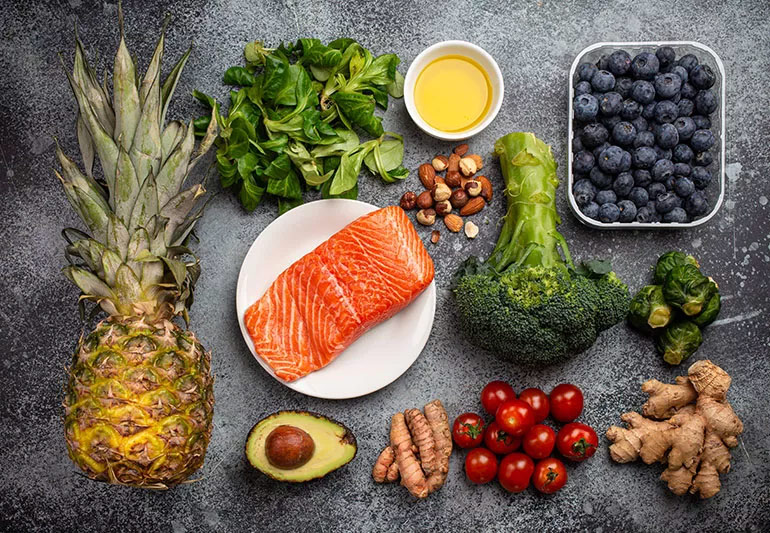
Inflammation has become a hot topic in the health and wellness space, with many people turning to anti-inflammatory diets to manage chronic health conditions. From Bollywood stars like Samantha Ruth Prabhu and Vidya Balan to fitness enthusiasts, more people are exploring ways to regulate the body's inflammatory response through lifestyle changes.
Table of Content:-
Celebrity nutritionist Rujuta Diwekar recently shared her expert insights on the subject in a social media post. She clarified that inflammation is not inherently bad; in fact, it plays a crucial role in healing and recovery. However, chronic inflammation can contribute to long-term health issues. In her video, Diwekar busted myths around so-called miracle cures and emphasised the need for a holistic approach.
View this post on Instagram
Understanding Inflammation: A Natural Body Response
Inflammation is the body's natural defense mechanism against injury, infection, or harmful stimuli. It is essential for recovery, as it helps the body repair damaged tissues and fight infections. However, when inflammation becomes chronic due to poor diet, sedentary habits, stress, or lack of sleep, it can lead to serious health concerns, including heart disease, diabetes, and autoimmune conditions.
Diwekar highlighted that many people mistakenly believe in quick-fix remedies to reduce inflammation, such as consuming turmeric shots, detox juices, or raw food-only diets. She debunked the idea that a single intervention could regulate the body's inflammatory response and encouraged a balanced, sustainable approach.
Also Read: Navjot Singh Sidhu Stuns Fans With 33 Kg Weight Loss, Shares Jaw-Dropping Transformation Pictures
Key Factors to Regulate Inflammation Naturally
According to Rujuta Diwekar, maintaining a healthy inflammatory response requires a multi-faceted approach, incorporating proper diet, exercise, sleep, and stress management.
Food: No Magic Bullet for Inflammation
Many diet trends claim to "cure" inflammation with superfoods or juice cleanses. However, Diwekar stressed that no single food or drink can completely regulate inflammation. While certain foods do have anti-inflammatory properties, they work best as part of a well-rounded diet rather than quick fixes.

Instead of relying on extreme dietary interventions like raw food-only meals or excessive smoothie consumption, she advised focusing on balanced nutrition with whole, unprocessed foods.
Exercise: Striking the Right Balance
Physical activity plays a significant role in inflammation regulation, but Diwekar cautioned against both extremes—too much and too little exercise can contribute to chronic inflammation. While a sedentary lifestyle can lead to increased inflammation and metabolic issues, excessive workouts without proper recovery can stress the body and worsen inflammation.
Also Read: New Mom Sonnalli Seygall Shares Exercises To Do In 9th Month Pregnancy For A Smooth Delivery
She recommended incorporating moderate exercise like strength training, yoga, and daily walks to support overall health.
Sleep: The Overlooked Healer
Many people underestimate the power of good sleep when it comes to reducing inflammation. Diwekar emphasised that proper sleep hygiene is critical for the body's healing process. Sleep deprivation can trigger chronic inflammation, increase stress levels, and contribute to long-term health risks.

She encouraged prioritising quality sleep by maintaining a consistent sleep schedule, avoiding screens before bedtime, and creating a restful sleep environment.
Stress Management: The Key to Holistic Wellness
Modern lifestyles often lead to high stress levels, which can fuel inflammation in the body. Diwekar urged people to stop seeking external validation and instead focus on self-care and mental well-being. Stress reduction techniques such as meditation, mindfulness, deep breathing, and engaging in hobbies can help manage inflammation naturally.
Can an Anti-Inflammatory Diet Meet All Nutritional Needs?
An anti-inflammatory diet can be highly beneficial, but its effectiveness depends on various factors, including an individual’s metabolism, dietary preferences, and portion control. Meal planning plays a crucial role in ensuring that all essential nutrients are consumed in the right quantities.
Diwekar highlighted that while anti-inflammatory foods are powerful, they should be part of a larger lifestyle strategy that includes exercise, rest, and stress management.
Bottomline
Rujuta Diwekar’s insights reinforce the importance of a well-rounded approach to health. Instead of following short-term fads or extreme diets, she advocates for simple, sustainable lifestyle changes that can help regulate inflammation naturally.
By prioritising balanced nutrition, regular physical activity, quality sleep, and mental well-being, individuals can support their body’s natural healing process and reduce the risk of chronic inflammation. For those looking to embrace an anti-inflammatory lifestyle, the key is to focus on consistency and long-term habits rather than quick fixes.
Also watch this video
How we keep this article up to date:
We work with experts and keep a close eye on the latest in health and wellness. Whenever there is a new research or helpful information, we update our articles with accurate and useful advice.
Current Version